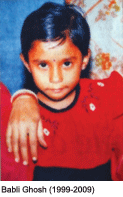Even the most strident critics of communist governments the world over — including critics of the late, unlamented Communist Party of the Soviet Union — concede that whatever the other faults of usually brutal communist regimes, they tend to accord high priority to, and establish sound and well-governed, elementary education systems. But the eastern seaboard state of West Bengal, which has been ruled by a coalition of left parties led by the Communist Party of India-Marxist (CPM) since 1977, seems to be an exception. On every benchmark of education attainment — adult literacy (69 percent), primary school dropouts (59 percent), teacher-pupil ratio (1:33) — contemporary West Bengal (pop. 80.2 million) is ranked among India’s most backward states.
The benign neglect of West Bengal’s 7.22 million children in government-run primaries was forcefully illustrated by a brutal assault by schoolteacher Rekha Bhakat of the Andal Girls High School (150 km north of Kolkata) who, incensed by the failure of her ten-year old pupil Babli Ghosh to write her classwork properly, flung a wooden duster aimed at Babli and slapped her repeatedly, resulting in her death.
 With Bhakat “absconding” until the date of filing this report (May 24), the state government school’s management has been cool about investigating this horrible incident. “The entire matter will be settled only after meetings of the managing committee and the staff council are held,” says headmistress Tapati Bhattacharya. Likewise Partha Dey, minister of school education and overlord of West Bengal’s 59,223 state-sponsored primary-secondary schools, seemed unperturbed by the shocking incident. “We have to come up with more ways through which we can stop such practices,” he said without elaborating.
With Bhakat “absconding” until the date of filing this report (May 24), the state government school’s management has been cool about investigating this horrible incident. “The entire matter will be settled only after meetings of the managing committee and the staff council are held,” says headmistress Tapati Bhattacharya. Likewise Partha Dey, minister of school education and overlord of West Bengal’s 59,223 state-sponsored primary-secondary schools, seemed unperturbed by the shocking incident. “We have to come up with more ways through which we can stop such practices,” he said without elaborating.
Although Kolkata’s middle class and the media expressed shock and outrage over the facts and circumstance leading to little Babli’s cruel death, the muted reaction of the education minister is unsurprising for informed monitors of Indian education. “The plain truth is that 99 percent of government school teachers are CPM party members who double up as poll campaigners and election returning officers useful for rigging the polls. They are also organised into powerful CPM-controlled teachers’ unions. Therefore the Left Front government is beholden to the teachers’ community. Indeed in communist-ruled West Bengal, the public education system is run to provide well-paid jobs to party members rather than for the benefit of poor, lower class students who perforce attend government schools,” says a Kolkata-based educationist who preferred to remain anonymous.
Confirms Ashok Maiti, general secretary, West Bengal Headmasters’ Association: “Most teachers found to indulge in such practices are not punished. This has encouraged most teachers to believe they can escape punishment.”
A top official of the West Bengal Board of Secondary Education (WBBSE) told your correspondent in a rare moment of candour that although there were many witnesses to Bhakat’s assault upon little Babli, the most the school’s managing committee can do is to suspend her and then “recommend” her dismissal to WBBSE. WBBSE’s disciplinary committee will review this recommendation and can either reinstate or dismiss her. If dismissed, Bhakat is permitted to file an appeal with WBBSE’s high-level appeals committee chaired by a retired high court judge. The process could take several years.
Meanwhile, on behalf of Babli’s family, senior advocate Tapas Kumar Bhanja has filed a public interest litigation (PIL) in the Calcutta high court seeking compensation of Rs.50 lakh. Moreover on May 22, the high court sought a report from the state government on what action it has taken.
Yet routine infliction of cruel and unusual punishment by teachers upon children is not a phenomenon restricted to communist-ruled West Bengal. A study titled Impact of Corporal Punishment on School Children — A Research Study conducted by Saath Charitable Trust, an Ahmedabad based NGO in 2007, states that corporal punishment is an accepted way of life in India — both in schools and households.
But proof of open, uninterrupted and continuous abuse of children’s rights countrywide, is unlikely to provide consolation to little Babli’s grieving parents.
Sujoy Gupta (Kolkata)